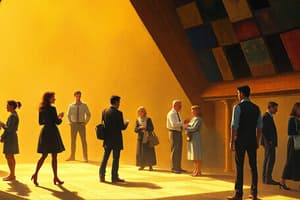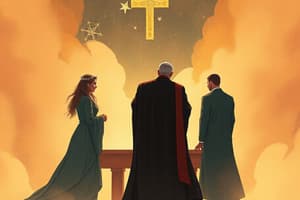Podcast
Questions and Answers
What does dramaturgical theory view social life as?
What does dramaturgical theory view social life as?
- A historical event
- A scientific experiment
- A theatrical performance (correct)
- A competitive sport
Who is associated with the development of dramaturgical theory?
Who is associated with the development of dramaturgical theory?
Erving Goffman
In dramaturgical theory, we are both actors and audience at the same time.
In dramaturgical theory, we are both actors and audience at the same time.
True (A)
What is impression management?
What is impression management?
What are frames in the context of dramaturgical theory?
What are frames in the context of dramaturgical theory?
What does the Dramaturgical Model of Communication illustrate?
What does the Dramaturgical Model of Communication illustrate?
The dramaturgical theory is considered humanistic.
The dramaturgical theory is considered humanistic.
What are some critiques of dramaturgical theory?
What are some critiques of dramaturgical theory?
What is the front stage in social interactions?
What is the front stage in social interactions?
What is the back stage in social interactions?
What is the back stage in social interactions?
Flashcards are hidden until you start studying
Study Notes
Dramaturgical Theory Overview
- Developed by Erving Goffman in the 1950s, presenting social life as a theatrical performance.
- Individuals act as both performers and observers, participating in a dynamic interchange of roles and impressions.
Key Concepts
- Impression Management: The process of influencing how others perceive oneself, striving for a desired image.
- Frames: Cognitive structures that help define social situations, relying on shared understanding or cultural context to interpret interactions.
- Dramaturgical Model of Communication: Emphasizes the roles we adopt, the stages we perform on (like classrooms for students), and the continuous creation of meaning.
Nature of Theory
- Classified as humanistic, focusing on individual social selves while recognizing the broader societal context.
Critiques of the Theory
- Raises questions about whether dramaturgical concepts serve as a metaphor for life or accurately describe it.
- Criticized for potential lack of empirical support regarding the performative nature of social roles.
Social Interaction Settings
- Front Stage: Setting where individuals perform publicly, aiming to uphold specific impressions.
- Back Stage: Private space where individuals can relax and rehearse their behavior, away from societal scrutiny.
Studying That Suits You
Use AI to generate personalized quizzes and flashcards to suit your learning preferences.






